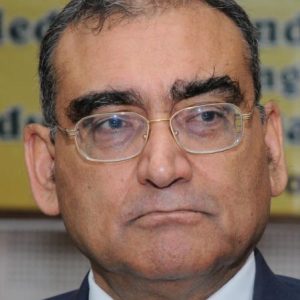Examining the Symbols of Justice and Democracy Amidst India’s Constitutional Challenges.
A SUIT WAS was filed in a court in Sambhal, Uttar Pradesh, by some Hindus alleging that the Jama Masjid there was built after destroying a Hindu temple.
Although the suit was barred by the Places of Worship Act, 1991, former Chief Justice of India D.Y. Chandrachud’s dishonest observation in the Gyanvapi mosque case has allowed courts to order surveys of mosques to uncover their history.
 This process often involves excavating mosques, ‘discovering’ remnants of Hindu temples, and ultimately leading to their destruction by mobs, as happened with the Babri Masjid.
This process often involves excavating mosques, ‘discovering’ remnants of Hindu temples, and ultimately leading to their destruction by mobs, as happened with the Babri Masjid.
In the Sambhal case, within an hour of the suit being filed, the court ordered a survey of the Jama Masjid without even hearing the mosque’s management. The survey began shortly thereafter. This high-handed action, which risked the mosque’s destruction, naturally evoked strong protests from the local Muslim community. Police opened fire on the protesters, killing several Muslims and injuring many others.
Many individuals, including opposition politicians, members of social organizations, and journalists, sought to visit Sambhal to ascertain the facts and meet the victims’ families. However, the district administration prohibited such visits.
The act of blocking political leaders, including Rahul Gandhi (Leader of the Opposition in the Lok Sabha), leaders of the Samajwadi Party and the Muslim League, and others, from visiting Sambhal—where six Muslim youths were shot dead by the UP police—is a gross violation of the constitutional rights guaranteed under Article 19(1)(d) of the Indian Constitution.
This article ensures all citizens the right to move freely throughout the country. While Article 19(5) permits reasonable restrictions in the interest of the general public, it is unclear how fact-finding visits or meeting bereaved families could harm public interest.
 Citizens have the right to protest against injustice. Authorities have no right to suppress such protests with force, including shooting at protesters, as occurred in the Jallianwala Bagh massacre in 1919 or Bloody Sunday in Russia in January 1905.
Citizens have the right to protest against injustice. Authorities have no right to suppress such protests with force, including shooting at protesters, as occurred in the Jallianwala Bagh massacre in 1919 or Bloody Sunday in Russia in January 1905.
Opposition leaders intended to ascertain facts, meet bereaved families, and offer solace—a humanitarian act. Preventing them from doing so is undemocratic and unbefitting of a civilized society. It does not align with any legitimate notion of public interest.
The UP government appears intent on suppressing the truth about the deaths of six Muslim youths who protested the survey of the Sambhal Jama Masjid. By preventing access to the site, they aim to conceal their high-handedness and control the narrative, forcing the public to accept the government’s version of events. This approach mirrors the handling of the Hathras gangrape case and the Batla House ‘encounter.’
 The government has attempted to shift the blame onto the protesters. Police have claimed, without credible evidence, that the protesters carried country-made guns and even ‘Pakistan-made’ bullets. This propaganda fails to explain why those alleged protesters would shoot at themselves and not at the police, or why no policemen sustained injuries in the so-called exchange of fire.
The government has attempted to shift the blame onto the protesters. Police have claimed, without credible evidence, that the protesters carried country-made guns and even ‘Pakistan-made’ bullets. This propaganda fails to explain why those alleged protesters would shoot at themselves and not at the police, or why no policemen sustained injuries in the so-called exchange of fire.
The UP government is clearly trying to shield the perpetrators responsible for the deaths of six Muslim youths who were protesting against the gross injustice committed under the BJP government. This government appears complicit with a largely dishonest judiciary and police.
This is the grim reality of the sham ‘democracy’ and ‘secularism’ prevailing in India today. ![]()
Also Read: EXPLOITING DIVISION
Disclaimer : PunjabTodayNews.com and other platforms of the Punjab Today group strive to include views and opinions from across the entire spectrum, but by no means do we agree with everything we publish. Our efforts and editorial choices consistently underscore our authors’ right to the freedom of speech. However, it should be clear to all readers that individual authors are responsible for the information, ideas or opinions in their articles, and very often, these do not reflect the views of PunjabTodayNews.com or other platforms of the group. Punjab Today does not assume any responsibility or liability for the views of authors whose work appears here.
Punjab Today believes in serious, engaging, narrative journalism at a time when mainstream media houses seem to have given up on long-form writing and news television has blurred or altogether erased the lines between news and slapstick entertainment. We at Punjab Today believe that readers such as yourself appreciate cerebral journalism, and would like you to hold us against the best international industry standards. Brickbats are welcome even more than bouquets, though an occasional pat on the back is always encouraging. Good journalism can be a lifeline in these uncertain times worldwide. You can support us in myriad ways. To begin with, by spreading word about us and forwarding this reportage. Stay engaged.
— Team PT

